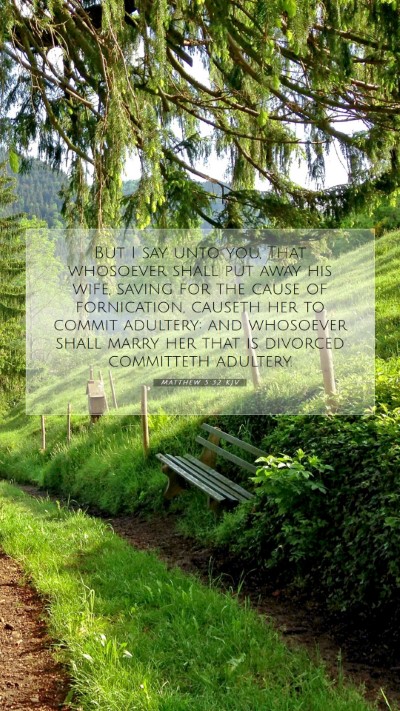Understanding Matthew 5:32
Matthew 5:32 states: "But I say to you that everyone who divorces his wife, except for the reason of unchastity, makes her commit adultery; and whoever marries a divorced woman commits adultery." This verse is part of Jesus' Sermon on the Mount, addressing the topic of divorce and the sanctity of marriage.
Context and Historical Background
This instruction is given within the cultural context of first-century Judaism, where divorce was easily granted for various reasons. The interpretations of the law were often manipulated to accommodate personal desires. Jesus emphasizes the seriousness of marriage and fidelity, challenging prevailing attitudes toward divorce.
Commentary Insights
-
Matthew Henry's Commentary:
Matthew Henry stresses that Jesus reaffirms the sanctity of marriage, asserting that divorce should be a serious matter. He indicates that unchastity refers to much more than mere infidelity; it points to a moral failing that jeopardizes the marriage covenant. Divorce, in Henry's view, goes against the original divine intention for marriage as an unbreakable union.
-
Albert Barnes' Notes:
Barnes elaborates on the phrase “makes her commit adultery,” suggesting that remarriage after an unjust divorce leads to further moral transgressions. He interprets this as Jesus upholding the law of Moses while also enlightening his followers about true righteousness, which exceeds mere legal compliance and delves into the ethical heart behind the law.
-
Adam Clarke's Commentary:
Adam Clarke focuses on the exceptions that Jesus provides regarding divorce, pointing out how this restricts the ability to divorce to cases of severe marital failure. Clarke notes that the verse emphasizes the consequences of divorce, warning believers about the implications of their actions and the state of their hearts regarding commitment and fidelity.
Key Themes in Matthew 5:32
- The Sanctity of Marriage: Jesus affirms that marriage is a covenant instituted by God, not merely a social contract.
- Conditionality of Divorce: The discussion around "unchastity" signifies that certain grounds, while legitimate, do not automatically justify a divorce.
- Accountability in Relationships: Individuals are held accountable for the choices they make within their marriages and the lasting impact those choices have on others.
Application for Today's Believers
This scripture serves as a profound reminder for individuals in contemporary society concerning the nature and commitment of marital relationships. Believers are called to take their vows seriously, understanding that each action has spiritual and moral implications.
Practical Reflections:
- Consider the foundation of your marital relationships: Are they built on love and commitment, or convenience?
- Engage in open conversations about fidelity and expectations with your spouse.
- Seek Bible study resources that delve deeper into the nature of marriage and effectively interpreting scriptures on relationship covenants.
Related Scripture References
- Genesis 2:24 - The creation narrative emphasizing the unity of marriage.
- Malachi 2:16 - God's disdain for divorce and betrayal between spouses.
- Romans 7:2-3 - The binding nature of marriage in relation to the law.
Conclusion
Matthew 5:32 carries significant weight in the context of Bible verse interpretations and understanding scripture related to marriage and divorce. The blend of Jesus’ teachings calls for deeper contemplation of our actions and their alignment with God’s intention for marital bonds. As believers seek to understand this verse and its implications, they can actively engage in biblical exegesis and study insights that foster growth in both personal and communal relationships.


